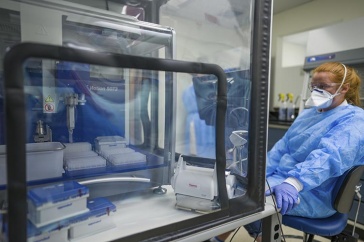UNH Strives for Safety: Testing for COVID-19 in State-of-The-Art Lab

Technicians at UNH’s testing lab are processing student swab samples monitoring for SARS-CoV-2, the virus that causes COVID-19. Photo credit: Jeremy Gasowski/UNH.
DURHAM, N.H.—The University of New Hampshire is testing students for the coronavirus in a newly created cutting-edge laboratory located on the Durham campus using self-swabbing home kits developed at UNH. The lab is exclusively testing for COVID-19 and will play a key role in the university’s commitment to extensively monitor the student population and quickly identify and prevent any spread of the virus and help provide a safe environment for students, faculty, staff and the community.
“We knew early on that we wanted to be aggressive in our testing, to make it easy for students and to get test results quickly,” said Marian McCord, senior vice provost for research, economic engagement and outreach. “With the delays in national testing, it became clear to ensure a quick turnaround and a safe campus we needed to do our own testing, so we tapped into the extensive expertise at UNH to find the right resources and help establish our own testing lab.”
The clinical testing lab, located at UNH Health & Wellness, is equipped with state-of-the-art instrumentation and robotics that can screen for COVID-19 on at least 4,000 samples a day. Tests results can be generated in under 48 hours. Completed in the span of 100 days, the facility has been certified by the Clinical Laboratory Improvement Amendments, or CLIA. It was designed to meet the university’s current testing protocols and incorporates flexibility to shift if technology or needs change in the future.
The testing facility incorporates automation along with a team of skilled lab technicians that work two shifts six days a week. The testing procedure uses what is known as pooled testing where individual samples are combined and tested together to allow for faster results. It is made up of three steps starting with the lab team that receives the test tubes containing student samples and scans the assigned barcodes and loads them into the automation. Then a liquid sample is extracted from each swab tube to detect the presence of the virus’s RNA. If RNA is present, it is isolated and then a specially designed machine, called RT-PCR, performs a multi-plex test where it probes three different areas of the virus’s genetic makeup to look for SARS-CoV-2, the virus that causes COVID-19.
“It is designed to inspect three different areas on the virus’s genome to provide more accuracy,” said Kelley Thomas, professor of molecular, cellular and biomedical sciences and director of the Hubbard Center for Genome Studies. “Because the virus can mutate or change, and there are also other types of coronaviruses, if the first probe looks at a genetic sequence that has been altered, it might not detect the COVID-19, so the multi-plex approach gives us more opportunities to detect the virus from a sample.”
UNHInnovation, the university’s commercialization enterprise, played a critical role in getting the testing lab operational.
“The logistics behind organizing, tracking and testing more than 15,000 people multiple times a week was challenging, to say the least,” said Marc Sedam, vice provost for innovation and new ventures. “Our staff onboarded a number of employees, ordered over 350,000 test kits, worked with dozens of colleagues to install a lab management system and printed hundreds of thousands of labels in preparation for the launch.”
UNHInnovation submitted an Emergency Use Authorization application with the U.S. Food and Drug Administration to create UNH’s own self-swabbing kits. Initial kits were pre-packaged by Foxx Life Sciences (Londonderry) with directions and distributed directly to students. The test is a less invasive nose swab that students can perform, put in a test tube with a specially created barcoded label and drop off at a designated site on a specific day.
Students will be tested every four days during the semester. The goal is to identify cases early so they can receive the proper care and prevent spread of the virus. The testing looks for any cases that are asymptomatic (no symptoms) or pre-symptomatic (eventually gets symptoms). If a positive result comes back the student is contacted by UNH Health & Wellness and the N.H. Department of Health and Human Services and will have a second test by a healthcare provider. If the second test is positive, the student will need to quarantine and contact tracing will begin.
Right now the UNH testing lab is only testing students on the Durham campus but testing for faculty and staff on the Durham campus will begin soon and will hopefully expand to process samples from other institutions in the University System of New Hampshire, including Keene State College and Plymouth State University.
The University of New Hampshire inspires innovation and transforms lives in our state, nation, and world. More than 16,000 students from all 50 states and 71 countries engage with an award-winning faculty in top-ranked programs in business, engineering, law, health and human services, liberal arts and the sciences across more than 200 programs of study. As one of the nation’s highest-performing research universities, UNH partners with NASA, NOAA, NSF and NIH, and receives more than $110 million in competitive external funding every year to further explore and define the frontiers of land, sea and space.
VIDEO AND PHOTOS FOR DOWNLOAD
Video and photo link: https://unh.box.com/s/yt3eg9aljjpnfh232ykwempeevrjv79h
Video credit: Courtesy University of New Hampshire
Photo credit: Jeremy Gasowski/UNH
Latest News
-
December 12, 2024
-
December 11, 2024
-
November 22, 2024
-
November 7, 2024
-
October 30, 2024
















































